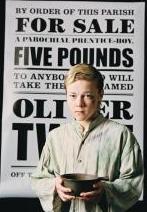SITE GUIDE
SEARCH
REVIEWS
FEATURES
NEWS
Etcetera and
Short Term Listings
LISTINGS
Broadway
Off-Broadway
NYC Restaurants
BOOKS and CDs
OTHER PLACES
Berkshires
London
California
New Jersey
DC
Philadelphia
Elsewhere
QUOTES
TKTS
PLAYWRIGHTS' ALBUMS
LETTERS TO EDITOR
FILM
LINKS
MISCELLANEOUS
Free Updates
Masthead
Writing for Us
A CurtainUp Review
Oliver Twist
|
There is a passion for hunting something deeply implanted in the human breast; Even when that something is but one wretched, breathless boy
--- Bystanders |

Jordan Metcalfe as Oliver
(Photo: Mark Douet) |
Bartlett's production is full of new and original references. The posters advertising the sale of Oliver to Sowerberry's, the firm of Funeral Directors look like the posters advertising slave auctions and we are reminded of how close to slavery existence was for these orphan boys from the workhouse. Michael Feast's mysterious, wild eyed Fagin is a character more inspired by the Russian mad monk Rasputin than Jewish.
Owen Sharpe is the Artful Dodger, his Mohican haircut looking totally in place in Dickensian London, narrates much of the action. His setting of the scene, always in character as the charming criminal, amuses and involves.
In the middle of all these darkly colourful and over the top characters is the figure of the innocent child, a blonde, quivering, helpless Oliver (Jordan Metcalfe), his predicament as deeply moving as anything I have seen on the stage for some time. It is this contrast between the contrived and the natural which lifts this production out of the ordinary. We are frightened for him being made to sleep with the coffins in the Sowerberry's, we feel his exhaustion as he walks to London, the director choosing to knock him down again and again as the narrator describes this journey where he walked for seven days until he was weak from exhaustion and his feet were bleeding. And just as he seems to have fallen on good times in the home of the benevolent Mr Brownlow (Thomas Wheatley) he is snatched back into the danger of Fagin's world.
The horrific murder of Nancy is not recreated in full but a simple tableau shows Bill's raised arm above Nancy's lifeless body. Sikes' torso falls through a trap door in the flies as we hear a description of how he hangs himself by accident while trying to escape. Bartlett underlines the power hierarchy of the underworld -- Fagin bullies the boys, while at the top of the heap, Bill Sikes intimidates Fagin.
The music is largely unaccompanied and in contrast to the Lionel Bart musical, the tunes are rough and difficult and atonal although we are told that these come from Victorian music hall. An out of tune violin and a tinny hurdy gurdy are all that is allowed in this play where poverty pervades, stifling any musical celebration. In Fagin's kitchen, the result is a cacophony as Fagin runs his enthusiastic class in the "game" of picking pockets.
Throughout this production, is a picture of London. Dodger repeats the place names which still exist in a litany of journeying like Pinter. "Chertsey - Bethnal Green, Finsbury Square, Smithfield, Holborn, Hyde Park Corner, Kensington, Hammersmith, Chiswick, Kew Bridge, Brentford, Shepperton, Chertsey." The play finishes as it began with a reference to childhood. "It is a solemn thing to hear, in a darkened room, the voice of a child".
| Oliver Twist
Written by Charles Dickens Adapted and directed by Neil Bartlett Starring: Michael Feast, Owen Sharpe With: Nicholas Asbury, Ryan Early, Nicholas Goode, Gregor Henderson-Begg, Paul Hunter, Derek Hutchinson, Jordan Metcalfe, Kellie Shirley, Thomas Wheatley, Louise Yates, Brigid Zengeni Designer: Rae Smith Lighting Designer: Paule Constable Sound: Nick Manning Music: Garard McBurney Movement: Struan Leslie Running time: Two and a half hours with one interval Box Office: 08700 500 511 Booking to 27th March 2004. Reviewed by Lizzie Loveridge based on 25th February 2004 Performance at the Lyric, King Street, Hammersmith London W6 (Tube: Hammersmith) |


Mendes at the Donmar
Our Review

Peter Ackroyd's History of London: The Biography

London Sketchbook

Somewhere For Me, a Biography of Richard Rodgers

At This Theater

Ridiculous!The Theatrical Life & Times of Charles Ludlam

The New York Times Book of Broadway: On the Aisle for the Unforgettable Plays of the Last Century

6, 500 Comparative Phrases including 800 Shakespearean Metaphors by CurtainUp's editor.
Click image to buy.
Go here for details and larger image.



